We publish this english translation of the article "O Estado e a Revolução" from issue 199 of A Nova Democracia:
One hundred years of the Great Socialist October Revolution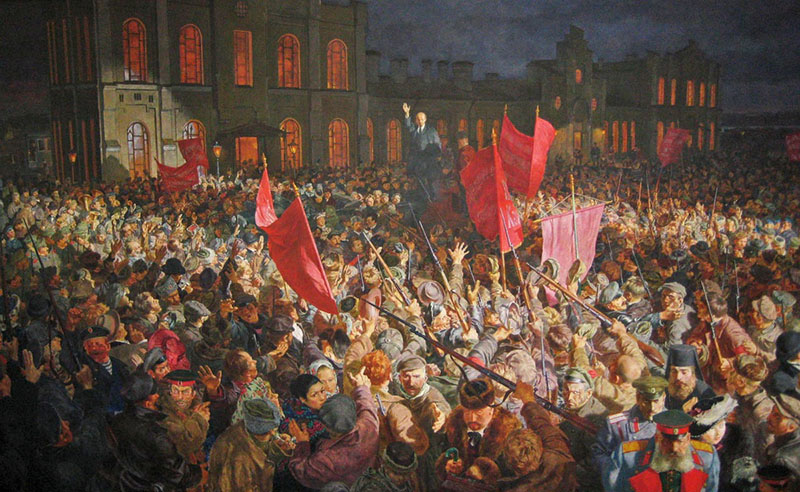
Introductory Note: It was during his exile in Finland that Lenin, with the help of books like On the War, from Clausewitz, and Civil War in France, from Marx, and tempered with the fire of the class struggle in Russia, wrote his famous work The State and the Revolution. The book, concluded on August, 1917, and published in the first semester of 1918, broaches the Power, the State theory - “ one of the most complicated and difficult problems, maybe the one that has created most misunderstanding by the bourgeois erudites, writers and philosophers”. Such a theory Lenin, the head of the Bolshevik Party and revolution, systematizes and develops during the Power struggle in Russia.
We will reproduce extracts of the remarkable work that, in a hard combat against opportunism from the Mensheviks and social-democrats1 of the II International, mostly his well-known representative, Karl Kautsky, Lenin calls attention to Marx and Engels ’s doctrine on the State and shows the main teaching of the Russian revolutions of 1905 and 1917 (up to the beginning of August).
The great revolutionaries have always been persecuted all their lives; their doctrine has always been the target of the fiercest anger, the most furious campaigns of lies and defamation from the ruling classes. After their death one tries to convert them in inoffensive idols, declaring them saints, surrounding their names of a sort of aureole of glory for ‘comforting’ and deceiving the oppressed classes, while emasculating the substance of their revolutionary teaching, demeaning them. The bourgeoisie and the opportunists of the working movement have gathered presently to inflict Marxism such a ‘treatment‘
Under such circumstances and as long as it was possible to largely spread the deformed Marxism, our mission is, before anything, to re-establish the true Marx’s doctrine on the State.
THE STATE ORIGIN
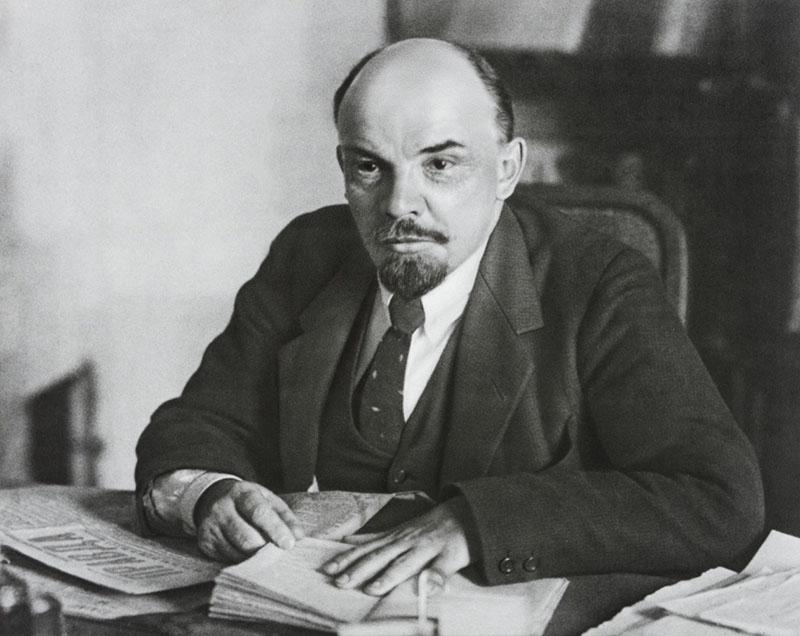
The State is the product and manifestation of the irreconcilable class antagonism. “There was a time the State did not exist, the general links, the society itself, discipline and work organizations were maintained by the force of clan‘s custom and tradition by authority and respect to the venerable old men and women - whose social position was similar to men and not rarely a superior social position - and there was not a special category of persons specialized in governing. History demonstrates that the State, as a special apparatus for men’s coercion, appears where and when the society divided in classes occurs, that is, the division in groups of persons, some of them appropriate permanently of another’s work, where one exploits the other.” (The State, Lenin)2
The State comes up where and when the class antagonism cannot objectively be conciliated. And, reciprocally, the State existence proves that the class contradictions are irreconcilable.
It is precisely on this question of fundamental importance that starts the Marxism deformation according to two main lines. From one side, the bourgeois ideologists and, above all, the ones from the petty-bourgeoisie who under the pressure of the undeniable historical facts have to recognize that the State does not exist unless where there are contradictions and class struggle, they ‘correct’ Marx in a way to make him say that the State is the organism of class conciliation.
Thus, during the 1917 revolution, when the issue of the meaning of the State role was whole exposed as if requiring an immediate action from the masses, all socialist-revolutionaries3 and all Mensheviks4 adhere totally to the bourgeois theory of class ‘conciliation’ by the ‘State’. Several resolutions and articles of those politicians are deeply impregnated of the ‘conciliation’ bourgeois opportunist theory. That petty-bourgeois democracy is unable to understand that the State is the organism for dominating a certain class that cannot conciliate with its antipode ( an adverse class). Their notion on the State is one of the most manifest signs that our socialist-revolutionaries and our Mensheviks are not socialists as we, Bolsheviks, have always demonstrated but petty-bourgeois democrat with a phraseology nearly socialist.
Engels says that, by seizing the power, the proletariat “by this mean abolishes the State as State”. “It is not used” to deepen what this means. In general, one despises entirely this thinking or seeing it as a kind of Engels‘ ‘Hegelian weakness’. In fact, this words mean, in brief, the experience of one of the biggest proletarian revolutions, the Commune experience of 1871; we will talk about it with more details on a competent place. As a matter of fact, Engels talks about the bourgeois State ‘abolition’ by the proletarian revolution, while his words on the ‘weakening’ and ‘death’ of the State refer to the vestiges of the proletarian State that remain after the socialist revolution. According to Engels, the bourgeois State does not ‘die’, it is ‘annihilated’ by the proletariat in the revolution. What dies after the revolution is the proletarian State or semi-State.
The State is “ a special force of repression”. Such a deep and remarkable definition of Engels is crystal clear. It results from it that this proletariat “special force of repression” by bourgeoisie, million of workers by a bunch of rich ones, must be replaced by “a special force of repression” of the bourgeoisie by the proletariat ( the proletarian dictatorship). This consists in the “abolition of the State as a State”. This consists of the possession ‘act’ of the means of production in name of the society. As a consequence, such a replacement of a “special force” ( the bourgeoisie’s) by another “special force” (the proletariat’s) cannot be equivalent for that one of “wasting away”. The “wasting away”, or to be more precise, such a “lethargy”, Engels puts clearly in the subsequent period to the “act of possession of the means of production by the State, in the name of the society”, therefore, posterior to the socialist revolution. We all know that the political shape of the ‘State’ is, then, the full democracy. But none of the opportunists who impudently depreciate Marxism understand Engels is referring to “lethargy” and to “death” of democracy.
At first sight, it looks strange but it is only inconceivable for those who do not understand that democracy is the State as well and, therefore, it will disappear when the State disappears. Only the revolution can ‘”abolish the bourgeois State. The State in general, that is, the full democracy can only ‘waste away”.
At announcing the remarkable formula “The State dies”, Engels hurried to explain that such a formula is directed against the opportunists and anarchists. And he puts in first place the corollary that reaches the opportunists.
The essence of all doctrine of Marx and Engels is the need to inoculate systematically in the masses that idea of a violent revolution. It is the omission of that propaganda, agitation, that emphasizes the doctrinaire betrayal of the tendencies social-patriotic and kaustikets.
The replacement of the bourgeois State by the proletarian State is not possible without a violent revolution. The abolition of the proletarian State, i.e., the abolition of all and any State can only be possible by the “wasting away”.
Marx and Engels have developed that theory by a more detailed and concrete form, studying separately each revolutionary situation and analysing the lessons from the experience of each particular revolution.
THE STATE ROLE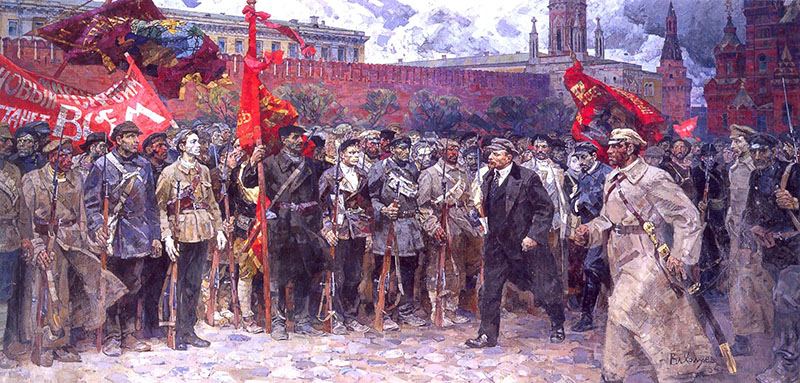
Soldiers of the Revolution, by Vladimir Kholuyev, 1964
The State is the special organization of a force, a force destined to subjugate determined class. Which is then the class the proletariat must subjugate? Evidently, only the exploiters class, the bourgeoisie. The workers need the State only to break the resistance of the exploiters, and only the proletariat has capacity for that, because the proletariat is the only revolutionary class able up to the end to unite all workers and all exploited people in the struggle against the bourgeoisie in order to tramp it definitely.
The exploiting classes need the political domination for the maintenance of exploitation, with the selfish interest of a very small minority against a large majority of people. The exploited classes need the political domination for the complete annihilation of any exploitation, in the interest of the large majority of people against a very small minority of modern slavish, that is, the landlords and the capitalists.
The petty-bourgeois democrats, those pseudo-socialists who replaced the class struggle by their fantasy of harmony between the classes, made up the socialist change into a kind of dream: for them it is not a question of destroying the exploiting class domination but to submit to the majority the conscious minority to their role little by little. The only result of this petty-bourgeois utopia indissolubly linked to the idea of a State above the class was the betrayal of the interests of the working class as the history of the French Revolutions of 1848 and 1971 have proved, as the experience of “socialist” participation in the bourgeois ministries in England, France, Italy and other countries, at the end of the 19th century and beginning of the 20th century have proved.
The class struggle doctrine, applied by Marx and Engels to the State and to the socialist revolution leads necessarily to the acknowledgement of the political supremacy, the dictatorship of the proletariat, i. e., a proletarian power exercised without partition and supported directly by the force of the masses in arms. The overthrowing of the bourgeoisie can only be accomplished by the change of the proletariat into ruling class, able to dominate the inevitable and desperate resistance of the bourgeoisie and organise all the toiling exploited masses for a new economic regime.
The proletariat needs the political power, the centralized organization of force, the organization of violence to repress the exploiters resistance and lead the huge mass of the population - the peasants, the petty-bourgeoisie, the semi-proletarians - to the “edification” of the socialist economy.
By educating the proletarian party, Marxism shapes the proletarian vanguard, capable to seize the power and lead the whole people to socialism, able to direct and organize the new regime, be the instructor, the head and guide of all workers, of all exploited people. For the creation of a society without the bourgeoisie and against the bourgeoisie. Opportunism, on the contrary, disjoints the masses and only educates in the proletarian party the representatives of the workers more distributed who “instal themselves” very comfortably in a capitalist regime and sell for nothing their primogeniture, that is, renouncing to the role as revolutionary people’s guides against bourgeoisie.
THE COMMUNE EXPERIENCE
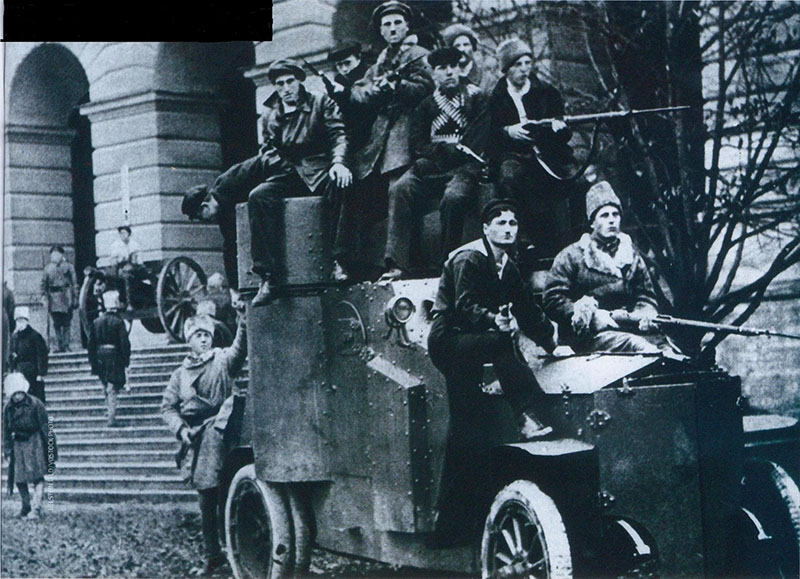
Armed in front of the Smolny Institute, in Petrograd, 1917
In Civil War in France, Marx closely analyses the Commune experience despite its debility.
The Commune “contented itself, one could say, to replace the State apparatus, broken by a democracy, the most complete suppression of the permanent army, eligibility, and not movibility of the whole staff”. In fact it “contented itself” in replacing - a giant work - certain institutions by other ones essentially different.
To defeat the bourgeoisie and break its resistance was, for that, a necessity. For the Commune it was particularly necessary and one of the causes of its defeat was not to flow into such a task. The repression organism in the Commune was the majority of the population and not the minority as it was in the slavery, vassalage and salary period. Once it is the majority of people who oppresses its oppressors, there is not need anymore for a repression “special force”! The State, in this sense, starts weakening itself. Instead of special institutions from a privileged minority (civil employees, permanent army chiefs), the majority itself can directly perform the public power functions, and the more the people take over those functions, the less the need of that power will be felt.
About it, it is particularly remarkable one of the measures taken by the Commune and emphasized by Marx: the suppression of all representation expenses, suppression of the employees’ pecuniary privileges, reduction of “all” administrative salaries to “worker’s salary”. The harsh passage of the bourgeois democracy to the proletarian democracy, the change of the oppressor democracy for the oppressed democracy, the passage of the domination of a “special force” destined to oppress a certain class for smashing the oppressors by combined forces of the majority of people are noticed here.
CRITICISM TO THE BOURGEOIS PARLIAMENTARISM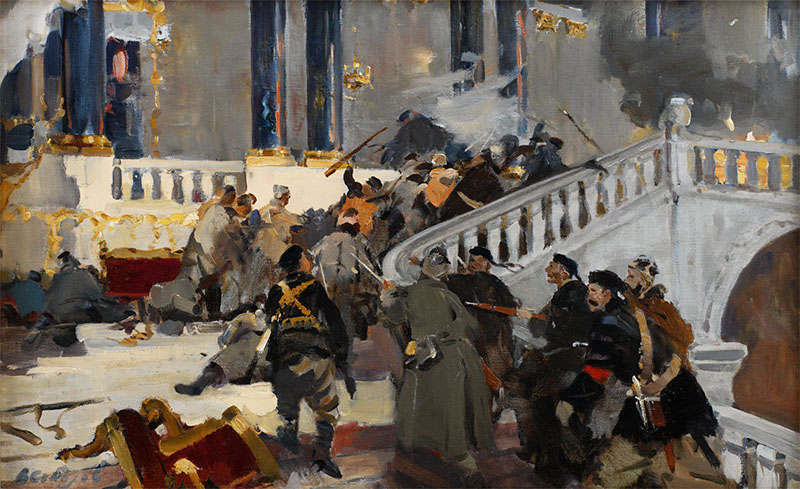
'Storming the Winter Palace', oil painting by Vasili Vasilevich Sokolov, 1962
To decide from time to time, during a certain number of years which member of the ruling class will oppress and crush people in parliament, it is the very essence of the bourgeois parliamentary, not only for the parliament constitutional monarchies but for the most democratic republics as well.
The Commune replaces this corrupt and rotten parliamentary of the bourgeois society by institutions in which the discussion and examination freedom did not degenerate on cheating; the mandataries themselves must work and exercise their laws, checking the results obtained and answering directly before their voters. The representative institutions are maintained but there is not parliamentary as a special system as division of the legislative and executive work, as in a privileged situation for the deputies. We cannot have an idea of a democracy even proletarian without representative institutions but we can and must accomplish it without parliamentary if the criticism to the bourgeois society is not, at least for us, a vain word, if our efforts to destroy the bourgeoisie dominance is an honest and sincere effort and not an “elective” expression simply destined to steal the workers’ ballots as it happens with Mensheviks and revolutionary socialists.
There is not any parcel of utopia in Marx. He does not invent, he does not imagine a ready-made ‘new’ society. No, he does not. He studies, as in a natural history process, the genesis of the new society from the old one, the intermediary forms between one and the other. He bases on the experience of the proletarian movement and tries to take from it practical lessons. “Go the the Commune School” as all the great revolutionary thinkers did and he did not hesitate to participate in the the great moviments of the oppresses class, instead of preaching to it a pedantic moral, as Plekhanov when he says”: You should not take up arms!” or Tseterelli affirms: “ A class must know by itself to limit its aspirations”.
It is not a matter of annihilating the staff at once, completely and everywhere. That is utopia. But to destroy instead the old administrative apparatus to immediately start building a new one which permits to supress gradually the staff; this is not an utopia, it is the Commune experience, the main and immediate task for the revolutionary proletariat.
Socialism simplifies the functions for the ‘State’ administration, permitting to supress the “hierarchy”, reducing everything to a proletarians organization in ruling class to employ - on account of the whole society - workers, foremen, and book-keepers.
The Commune is not the form “finally found” by the proletarian revolution under which it is effectuated the economic emancipation of the State.
The Commune is the first attempt of the proletarian revolution for demolishing the State bourgeois apparatus; it is the political form, “finally found “ that can and must replace what has been demolished.
POLEMICS WITH ANARCHISTS
Marxism has always taught that the State suppression must coincide with the class suppression. The remarkable part of Anti-During on the weakening of State does not accuse the anarchists to want the State suppression but to intend to accomplish it “overnight”.
Marx on purpose emphasizes - so that they do not disfigure the real sense of his fight against anarchism - “ the revolutionary and transitory” State form, necessary to proletariat. The proletariat needs the State for a while. On the question of State suppression, as an objective, we do not separate ourselves absolutely from the anarchists. We sustain that, to reach this objective it is indispensable to use provisorily against the exploiters the tools, the means and procedures of the political power, in the same way that, for suppressing the classe, it is indispensable the provisional dictatorship of the oppressed class. Marx chooses the more incisive and clear form to place the question against the anarchist repelling the “capitalist bondage”, the workers must “put down the arms” or, on the contrary, to use them against the capitlaists in order to break their resistance? If a class systematically uses arms against another class, what is it except a new “transitory form” of State?
The criticism to anarchism for the contemporaneous social-democrats is reduced the pure bourgeois banality. “We are adherent of the State and anarchists are not!” One must understand that such a nuisance does not prevent from provoking aversion to the workers however much cautious and revolutionary they can be. Engels’ language is another and he shows that all socialists admit the State disappearance as a consequence of the socialist revolution. Directly afterwards he formulates concretely the revolution question, the question that the opportunist social-democrats put aside, abandoning to the anarchists the monopoly of this “study”. By formulating this question, Engels tackles a task with energy affirming that should the Commune have not used better the revolutionary State power, i. e., the armed proletariat, organized as a ruling class?

Notes:
1 Social-democrats- as the Marxist were denominated on the second half of the 19th century up to the October Revolution of 1917. In case one refers to the social-democrats of the II International , it is a matter of the partisans of the II Internationa who degenerated on the previous years to the First World War, becoming opportunists, revising Marxism to renegate them completely.
2 Conference held by Lenin at the University Sverdlov, in 1919. At the conference Lenin sinthetesis the State question exposed on his work The State and the Revolution.
3 Mensheviks: designation of the reformist-economicist petty-bourgeois line which gathered the oppositors to the revolutionary line represented by Lenin and most of the leading cadres of the Bolshevik Party. The Mensheviks refuted the proletariat hegemony on the democratic-bourgeois revolution and affirmed the working class should submit to the bourgeois leadership.
4 Socialist-revolutionaries: the Socialist-Revolutionary Party was asmall petty-bourgeois party that appeared in Russia between 1901-1902 as a rsutlof the fusion of several populist groups. During the cicvil war years theu participated in the counter-revolutionary conspiracies and organized atentats against Soviet State personaliteies and the Communist Party.
